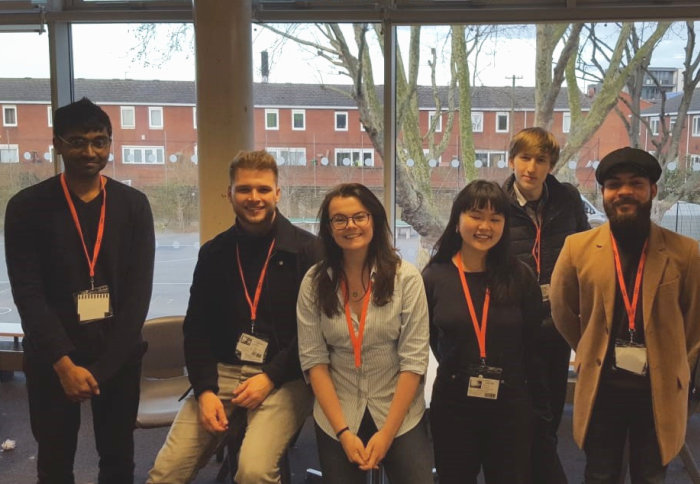Science Communications students inspire the next generation

L-R: Jason Murugesu, Tom Stephens, Sophie Ward, Rachel Ng, Aaron Hadley, Andrew Dixon
Imperial MSc Science Communication students are supporting pupils at City Academy Hackney with weekly A-level tutorial sessions.
The project, established two years ago by the Science Communication Unit, has gone from strength to strength as more students volunteer to provide advice to students making the difficult transition from GCSE STEM subjects to A-level.
Sophie Ward, PhD student at Imperial and tutor in Biology at City Academy Hackney, London, said: "We started this as a small project and it's just grown and grown.
"Many pupils were experiencing a drop-off not only in their enthusiasm for science subjects, but also a decline in their grade expectations." Sophie Ward PhD student
"In terms of ability, it's a really mixed school. They were finding that between GCSE and A-level many pupils were experiencing a drop-off not only in their enthusiasm for science subjects, but also a decline in their grade expectations.
"We wanted to provide them with support and also get experience of communicating with different audiences."
Pupils were enthusiastic about the difference their tutors were making to their studies, with comments including, "Very useful, teaches us life skills, provides good resources and helps me understand content well." and "Jason has been super helpful in helping us work on Maths and improving our grades."

Dr Stephen Webster, Director of the Science Communication Unit, said: "Talking to my students about this project, I can see how much learning has been going on.
"Imperial Science Communications students are working with City Academy sixth-formers, finding out about their ambition to study STEM subjects at university.They're massively helping the pupils too, by tutoring A-level topics to school students on the run-up to their exams. Each week my students are over in Hackney, building great relationships - and a more confident understanding of science."
Imperial's Science Communication Unit offers MSc courses in Science Communication and Science Media Production, both of which were the first of their kind in Europe. The courses explore all aspects of speaking with the public and the media, as well as a particular focus on producing content that allows scientists to present their work in an accessible way. Graduates from these courses find employment in a range of media outlets, including New Scientist magazine, the Science Museum and the BBC.

Imperial's school connections
Imperial's outreach activities provide information, build confidence and nurture the potential of the next generation of students, regardless of background, to consider STEM subjects at university.
Most recently the School's Challenge, run by Imperial in collaboration with J. P. Morgan, brought together 176 students from 12 schools across London at the Science Museum this week for a grand final competition.
The challenge is set by the Mayor of London’s Office, in order to solve some of the most pressing issues facing London. It encourages pupils to create a new product aimed at making their city a better place to live – focused on either air pollution, urban biodiversity or the sustainable city. The teams had the opportunity to develop their idea from the initial concept through to physical prototype development in Imperial’s state of the art community innovation facility, the Reach Out Makerspace.
A recent showcase at the Francis Crick Institute on 18 March also demonstrated the work of the Institute for Research in Schools (IRIS). Founded by Professor Steven Rose from Imperial's Department of Physics, the scheme expanded into a national network of more than 200 UK schools participating in real research often based on large datasets. Students from across the country presented their research at the celebration event, on everything from genomics to the benefits of nature and particle physics.
Founded by Professor Steven Rose from Imperial's Department of Physics, the scheme expanded into a national network of more than 200 UK schools participating in real research often based on large datasets. Students from across the country presented their research at the celebration event, on everything from genomics to the benefits of nature and particle physics.
Article text (excluding photos or graphics) © Imperial College London.
Photos and graphics subject to third party copyright used with permission or © Imperial College London.
Reporter
Murray MacKay
Communications Division